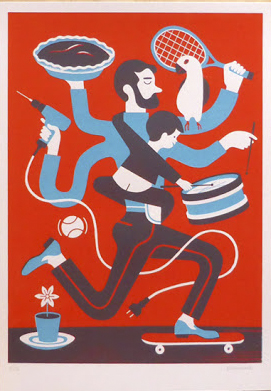
These thoughts are my random musings and there might not be a clear/coherent flow in the points mentioned but nevertheless, i believe these are some important things to keep in mind if you are trading the markets.
1. Have you taken a loss? Forget it quickly. Have you taken a profit? Forget it even quicker
Everything passes away – both success and failures
2. Chart patterns are as much art as science. If 25 people look at a chart and all 25 of them come to the same conclusion, then it becomes objective. If they dont come to the same conclusion, then its subjective
3. The market kindles your emotions. It pushes all our buttons of fear and greed – it ferrets out all. I found out very early in my career that i was not temperamentally too suited to be a great trader. The way i found to overcome this shortcoming is to have a definite set of entry/exit rules
4. Read a lot, test a lot and dont trade until you have a trading plan. Make sure your trading methodology is objective in nature as you have better odds of success stacked in your favor.
5. Learn to limit your risk – if we can stay in the game long enough, we will learn how to become successful in trading.
I always tell this to folks – if you can trade profitably for 10 yrs in trading and increased size steadily, you would have already amassed a small wealth or would amass it within the next couple of years
6. If one is following a system(mechanical)/methodology(discretionary) consistently and making money, how do we make more money then?
We have 2 options – more leverage or bigger size. My vote is for the latter as the former has decimated more accounts than what we can imagine. It will take a while to build size but it has to be done incrementally (and not exponentially with the use of leverage)
7. Many new traders wonder – what’s the best way to trade. Let me assure you that its an impossible question to answer. Nobody can tell you what’s going to suit you (except you).
Whatever methodology you use, it has to fit your personality. This is why copying somebody else’s system never works (almost) but one can derive ideas from it.
8. Every professional (irrespective of their profession) go through slumps.
Let it be Virat Kohli or Kobe Bryant or Tiger Woods or Lionel Messi – Slumps are inevitable but once we have come out of slump, no matter how long it takes, we know that we can do it again. If something is done once, we know it is a repeatable act. So, embrace slumps as that knowledge of digging ourselves out of slump is invaluable in the long run.
9. It is prudent to focus on exits rather than entries. There is only so much one can do in entries but they can do lot of variations in exits. It is impossible to tell in advance which trades will be the good ones.
Some folks say “take only the high probability trades” and they tend to forget the random nature of distribution of trades. We are better off taking all the trades if we are following a system.
10. You need to be willing to take small losses. Taking a small loss reinforces a trader’s sense of discipline and control. Losses are not failures – please etch this in your mind
11. Two primary reasons for why we focus on being right.
First, we are conditioned to be right by our school system.
Second, everyone in the trading industry gives people what they want – ways to be right (high winrate system is the main culprit) and that perpetuates the myth. The traders who identify this early in their career do really well.
12. The difficult thing for many traders is that we have so many choices on timeframes, different instruments/markets, to trade the trend/counter trend/non-directional(delta neutral) but guess what, we can’t do it all.
So, we have to sit down and decide the type of trading we will pursue upon. A lot of traders (atleast for few initial months/years) are trying to do it all.
13. Many ask me about what books to read – i recommend Market wizards book as it gives an idea to the new trader that there are dozens of traders who were doing different things but still able to do it well.
Think about it – you dont have to be only a 100 meter sprint runner to make it in athletics
14. All new traders will ‘have to pay their dues’ to the market – no exceptions here. They have to learn about excitement, fear and hope in trading. They have to make their own mistakes (I don’t believe in learning from mistakes of others in trading as trading is an experiential task)
15. If you are a trend follower, by and large, having profit targets wont work as the price of your underlying instrument can keep changing over the years and trust me, reframing the profit target is no easy task. So, start with the right thought-process if you are a trend follower (by exiting only when the trend bends)
16. I would highly suggest trading a breakout system initially as it teaches us to do things that are hard to do naturally – like buying high and selling higher or selling low and buying back lower.
17. If you are a pullback trader, check your trades over a long period of time (backtesting) – you will be surprised to find the best breakouts wont give you pullbacks to enter the trade. You are either in the trade or you are not.
18. Big gaps are always a problem – one can expect short term volatility and hence, wider stoplosses (market driven) are possible. In short term trading, if you are stopped out of your trade after a big gap up/down, the reversal trade is usually very profitable.
19. When trading a trend following break out, your two best friends are ‘whipsaws and ‘law of large numbers’. If you dont understand whipsaws are part of Trend following-Breakout trading, then trading will be a mystery all the time
To accept whipsaws are part of Trend following-Breakout trading, one needs to understand the ‘Law of large numbers’.
A quick blogpost on ‘Law of large numbers’ here
Law of Large numbers and its implication in Trading
20. Last but not least – when you have a losing trade, it is ‘just’ a losing trade.
Many have difficulty in separating the reality of a losing trade from the psychological sense of feeling like a loser.
They equate losing with being a loser. This frustrates/depresses/creates anxiety about his P/L so much that it would start affecting his self-image. So, losing is part of trading and that does not make you a loser
Hope it helps someone out there and happy trading all !!

Introduction
As a trader, everyone goes through the urge (multiple times) of improving themselves and more importantly, to improve the trading idea/strategy/mechanical system they trade.
Conventionally speaking, new traders and some experienced traders go through these thoughts at least few times in their trading career (however short that maybe 🙂 ) –
1. “I already have a trading system in place but i seem to get attracted towards other systems i see in social media/online”
2. “I went through an elongated time/points drawdown and i think is should change my system to keep drawdown to the minimum”
3. “This quarter was not as good as my previous quarters and i picked up 3 great ideas(based on this year’s market movement – Recency bias in play here) which i would implement from next trading day”
This begets an inevitable question in a trader’s mind – improving(adding/modifying or creating a new one) one’s parameters is good right? But, is it not system jumping? This is an interesting question as system jumping is a topic that flash across every new/experienced trader’s mind sooner or later
Is Improving a system bad?
We all have read somewhere that ‘system jumping’ is bad 100 times from various resources. So, one should never try to better his own system?
1. Typically, when we are bombarded with new ideas/information about trading via social media/books/seminars, 2 schools of thoughts can arise —
A) If we start implementing ideas we see in a public domain/book or elsewhere, does it not amount to system jumping? If not, then what is system jumping?
B) What is wrong in improving my Risk:Reward/win ratio or other parameters (if i can)?
If we look into point A, we will understand that there is no definite answer for this dilemma. The answer lies in the belief we have about trading. As we have heard enough about ‘not jumping like a monkey from 1 tree to another’, we would have ingrained ‘system hopping’ is bad ?
And it is. Our minds habitually want to get away from discomfort/uncertainty. Human beings love certainty and the inherent nature of trading is full of uncertainties. In the pursuit of seeking certainty, folks jump from system 1 to system 2 seeking certainty. It is searching for a cotton candy seller in thunderstorm. Unless we relish the uncertainties that is inherent to trading, this profession would make us regret why did we ever come into it.
With my limited experience in the markets, i can say with a reasonable certainty that a new trader stands absolutely no chance against the deluge of info (promising the ‘holy grail’ system) that flows around everyday. He is bound to look for greener pasture.
I had written a blogpost on ‘Social media and its impact on the mindset of a trader’ sometime ago. Here is the blogpost
Social media and its impact on the mindset of a trader
2. When we are bombarded with these kind of information, it would be natural to think that the system we have (35% WR with 1:3.5RR) is the reason behind not making money in the markets. Nothing could be further from the truth. Think about it for a second.
If we look at point2, it is actually a valid thought. After all, we constantly endeavor to drive a better car, live in a better house, wear better clothes, eat better food. So, why not having something better than what we already have? Why trading system should be an exception? Great question.
Truth – Sticking to a system is much more difficult than jumping systems
Guess what – here are the real questions –
When do we stop? When we hit 80-90% winning system? or when we start making money?
Traders do system jumping as they strongly believe that ‘poor system’ is the reason for them to not make money in the markets.
a) Please understand that once we start to make money in our system (real money and not backtested excel money), that thought should dissipate slowly. Loitering on other people systems (available online and in forums) does not help the cause as well.
b) When we are in the process of building a system, any idea is worth looking into it. One can get inspired/derive ideas from other’s system – no issues with it. But. it is imperative that we understand the subtle difference between building a system based on a idea and jumping system because your social media hero made crores this year with his system.
c) I also know few traders who keep on testing systems (not to deploy more non-correlated systems for diversity but to jump the existing one – i have a differing thought on diversifying but thats for another day).
d) Unless we live in an isolated environment(without family/friends), this backtesting/improving system idea should stop somewhere (or it would be forcibly stopped by your family/spouse ? ) Trying new ideas forever would definitely rob us of the time we could spend with them.
e) This leads us to the most basic question of all – why did we come into this trading profession?
This is a question that needs to be asked to oneself in frequent interval. It is very easy to get lost in the information overload world we live in.
f) In my opinion, the improvement should happen in the trading size and it should happen in the execution (and not in the existing trading system with a positive expectancy). This thought process is very crucial.
Conclusion
There is not much difference between a system with 50% winrate and a system with 40% winrate (assuming RR/ number of trades are equal and systems have a positive edge/makes money in the long run).
Once we settle down, money management can fill the gap between these two systems nicely and over a period of 10 yrs, both these systems could have given a small fortune to a trader who respects risk. One can learn 100 books about psychology but nothing can beat the experiential learning aspects of handling ourselves when we traverse through the treacherous waters of trading ?
After all, your sub-conscious knows that you, yourself, cannot be trusted after breaking so many plans and giving up on so many goals.
Kindly sit on this thread (content) for a while. This will make lot of sense once we understand the mental framework behind this phenomenon.
Happy trading all !!
I always wondered why traders never get to the point of creating a solid trading plan/system and the reasons behind this phenomenon.
I love writing articles about trading psychology and this topic made me come out of hibernation. This blogpost is a small attempt to see the probable reasons behind procrastinating in formulating a system – from a psychological perspective.
 » More »
» More »

I have been running workshops couple of times in a quarter and get this question a lot – Is trading the markets an obsession/addiction? – Answer is both YES and NO. » More »

I read Market wizards book some 11 years ago and remember highlighting so many points that made sense to me those days. After someone talked about Jack Schwager recently, i thought i should read that classic book once again. » More »

Everybody wants to be a jack of all trades but many dont bother to master anything specific. This blogpost tries to analyse this topic from trading point of view. » More »

This blogpost is a small effort to delineate the thought process of a Professional in comparison to an amateur trader. » More »

Human nature is to be right all the time. Nobody likes to be wrong even in petty/useless arguments. This particular thought process is one of the primary reasons for many opting for methods that shows high winning percentage with abysmal Risk:Reward ratio. Many of the world’s renowned traders are trend followers and trend following usually delivers something that human brain is not used to – More losers than winners with superior Risk:Reward ratio. » More »

Introduction
Many folks find trading the markets pretty exciting. Why not? Seeing the tickers move wild can give great excitement to anyone and the prospect (not actually making money..just the prospect) of making money can give the best adrenaline rush . A fun-filled activity right? As a matter of fact, they become really sad when the markets are closed as there is no fun in mundane daily activities. » More »

Achilles’ heel was an unguarded weakness that ultimately brought down a hero of Greek mythology and this post is an attempt to understand the things that has to be kept in mind while designing a trading methodology as a discretionary trader.
As many of you know that am a mechanical(rule based) trader, my trading day is pretty monotonous and boring, many a times. The other group of traders are often called as ‘discretionary traders’. Both groups have their advantages/disadvantages and one should follow what they are comfortable with. At the end of the day, both discretionary and systematic traders have the same goal – making money.
What is discretionary/mechanical trading?
Discretionary trading is decision based trading – when the trading idea shows up in the charts, the trader decides(at that moment) whether to take the trade or not based on current market conditions. Discretionary trading does not mean random trading. Every trader(mechanical or discretionary) has a methodology to enter/exit the market – there are no two ways about it. For example, even if all the conditions are met for a trade, a discretionary trader will not take the trade as volatility is too low (current market condition) – so, basically the trader decides to let it go seeing the current market condition.
On the other hand, Mechanical trading is driven by rules. The trader do not make any decision on taking the trade but the system does. If A happens, then the trader go long and if B happens, the trader goes short. There is no element of decision making involved by the trader as everything is planned out beforehand and the trader just has to execute those trades.
Designing a trading methodology as a discretionary trader
There are certain things discretionary traders should keep in mind when they design their system. More often than not, the psychological pressure of making the ‘quality’ decision of whether to take the trade or not can overwhelm a discretionary trader. To understand this behavior, we need to analyze how our brain works.
A. How brain works?
Evolution has effectively given us (human beings) a dumb brain and a smart brain. The smart brain runs the show most of the times unless a threat is present/perceived and consequently, the dumb brain takes over. Why? The reason is very simple – Dumb brain is faster at making simple/resolute decisions. This avoids people taking a long time on making a choice as time is critical in predatory situations. If we take too much time to take a decision on ‘fight or flight’ situations, there is a good possibility of ending up in the jaws of a predator 🙂
B. Markets are there to get me
With this understanding in mind, one can easily comprehend why this could create a problem in trading as our natural responses can be inappropriate and the way we view/assess info changes when the dumb brain takes over.
Our brains are built to handle belligerent situations and hence, even in a normal situation in trading (like a loss – by the way, many dont consider trading loss as normal 🙂 ), we tend to do things like making “revenge trades”, which is treating the market like an adversary.
Think about it for a second – this is tantamount to curve fitting data so that it fits our trading model but only here, we are fitting the market to how our behavior and natural responses are designed to interact with predators. This is exactly why we see people saying ‘Markets are there to get me’
C. Demo trading and tunnel vision
As a discretionary trader, when we do demo trading of our ideas, we almost always get superlative results. The reasons could be multi-fold but the important one is so evident. When we practice in a non-stressful situation, we evaluate our success based on how our smart brain handles the situation. Under stress, in real trading, we might find that we fail to notice things that are obvious when we look at the same information after the stress has passed. People tend to overlook/ignore information that is contradictory to their analysis of the situation — popularly known as tunnel vision“.
Let us sit on this ‘tunnel vision’ for a moment. Like the airport traffic controller who ignores contradictory information (as he is affected by stress), traders fail to exit a losing trade, because our discriminative attention ignores things that indicate it’s time to get out of the trade. Practice (or demo trading) does help, but many traders find that their behavior is different under stress.
So, when a discretionary trader designs/practices a system, he needs to consider human behavior, psychology, and the human factors that were discussed here. In another post, i will discuss the difficulties in being a mechanical(systematic) trader.
Final thoughts
As it generally happens in any endeavor specific to a competitive pursuit, people end up with hallowed beliefs without subjecting them to rational scrutiny. The subject of ‘which style of trading is better’ is one such associated with the business of trading and is a favorite ‘peg to hang’ blame for failure in becoming a successful trader by many.
This blogpost does not favor one over the other – Pick the one that best suits you and pursue trading in that direction.
Happy trading all !!










